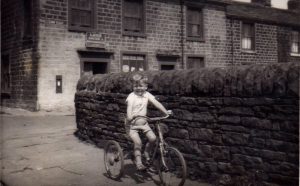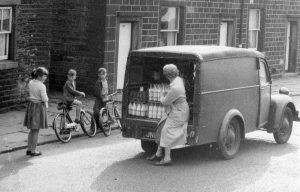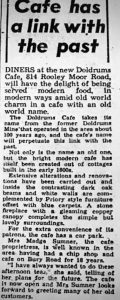Market
Rochdale is a market town and weekly markets have been held since 1251 when Edmund de Lacy procured a charter for a weekly market on Wednesday and an annual fair on the feast of St. Simon and St. Jude (28 October). This development was ultimately to bring great prosperity and Rooley Moor Road, which connects the north of Spotland with the Church and the market in the centre of Rochdale, was a major route to the market held outside the parish church where there was an “Orator’s Corner”.
In 1292 Henry de Lacy was required to show by what warrant he held the market and fair; Plac. de Quo Warr.
In 1296 the toll and stallage of the markets and fairs produced 53s. 8d, and 53s. 4d. in 1305, but were valued at only 30s. in 1311.
Market days were added in 1577 and 1673.
Camden in 1582 described Rochdale as ‘a market town well frequented.’
Defoe about 1724 described Rochdale as ‘a good market town, and of late much improved in the woollen manufacture, as are also the villages in its neighbourhood.’
The market day was changed from Wednesday to Monday during the 18th century, and Monday continues to be the ‘manufacturers’ market day; there is a provision market on Saturday.
The market rights were purchased from Lord Byron in 1823; the market hall, built in 1844, is still in the hands of a private company. The cattle market is in Manchester Road.
Shops
1958 – Corner shop at No.5 Smallshaw Road, Catley Lane Head. R Lees is recorded in the 1954-55 trade directory as the storekeeper. In the 1938 trade directory Samual Whitworth is recorded as a storekeeper living at No.9 Smallshaw Road.
Catley Lane Head Milk Lady
The Doldrums Tea Rooms
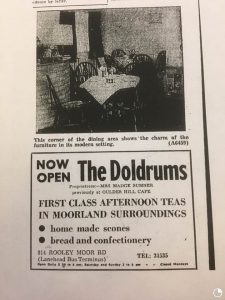 Win McGhee writes, “Here’s my story about the Doldrums Tea Room:
Win McGhee writes, “Here’s my story about the Doldrums Tea Room:
Pubs
Roydes Arms, Rooley Moor Road
In 1885 Sarah Nuttall is recorded in the Rochdale Trade Directory as the landlady.
The Black Dog, 31 Rooley Moor Road, Lanehead, Spotland
In 1885 James Holt is recorded in the Rochdale Trade Directory as the landlord.
The Moorcock Inn, Rooley Moor Road
In 1885 William Barnish is recorded in the Rochdale Trade Directory as the landlord for a pub by this name in Lanehead, Spotland and Thomas Taylor is recorded as the landlord for a pub in the Roolies, Spotland.
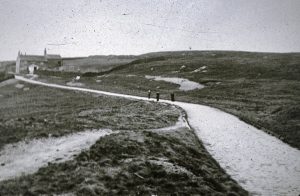
The following is reproduced with the kind permission of the Rossendale Collieries Facebook group.
The Moorcock Inn on Rooley Moor road is always a subject of interest and it’s walls could tell many a tale. The following court case makes it obvious that the police and local magistrates didn’t like the place and were clamping down on it. It is interesting to see how tight a grip they wanted to maintain on society a hundred years ago when a police officer would walk miles to prosecute somebody for having a pint at five minuets to twelve out of the way on the moors. It is obvious that it was also a concerted effort to go and catch them. The fine given to Mr Maden of £5 would be the equivalent of £435 today…..For serving a pint five minuets before time and there were no corroborating witness for the prosecution.
Rochdale Observer July 1st 1916
WHIT-SATURDAY AT THE MOORCOCK.
DRINKING IN PROHIBITED HOURS POLICEMAN’S VISIT TO ROOLEY MOOR LANDLORD FINED
At the county police court Wednesday the magistrates Sir Samuel Turner (in the chair), Alderman J. R. Heap, and Mr. J. S. Chetham were occupied for two hours and had in hearing case against Henry Maden, Moorcock Inn, Rooley Moor Road, Norden, for permitting the sale of intoxicating drinks during prohibited hours for supplying it. Three men —Michael Kerrone, Higher Greens, Stacksteads; Thomas Lord, 69 Back Wood, Stacksteads; and James Howarth. Lower Fold, Cowpe were summoned for consuming intoxicating liquor on licensed premises during prohibited hours. Mr. S. L. Coupe appeared for the defendants and pleaded ‘not guilty.”
P.C. Jump stated, that at quarter to twelve on the morning Saturday, June 17th, he visited the Moorcock Inn. Going into the kitchen he saw the three defendants. Kerrone, Lord, and Howarth, sitting at a table, which were two pint pots—one in front of Kerrone, which was half full of beer, and the other in front Lord, also half full of beer. By the side Howarth were a half pint glass and each half full of pale ale. On another table in the same room were eight empty glasses, which had also contained intoxicants, some beer and some spirits. Witness pointed out the time to the defendants and asked them if they had watches look and see the time for themselves. Lord did so and replied, think the clock must slow as it wants six minutes to.” There was clock hanging on the wall, which showed the time at 17′ minutes to 12. The correct time by the Town Hall clock was a quarter to twelve.
The witness asked Maden if he knew that, under the Liquor Control Board’s Order, he was prohibited from supplying intoxicants before 12 noon, and he answered, “I know.” Asked why he was permitting the sale he said, “Well, say about it and it blow over this time.”
When told he would be reported Kerrone said, “Well I know they are prohibited hours”; Lord answered, “I have only just come in, came for a walk and just called to get drink for my three lads who are outside.” Howarth’s explanation was, “ I am a shepherd and have come a-Looking after my sheep”.
Maden was told he would reported for permitting drinking and supplying. He followed the witness outside and said, “Come, now, let’s settle and say now’t about it.” Mrs. Maden was in the kitchen at the time. The addresses given by Lord and Howarth were correct, but Kerrone gave the name of John O’Brien and a false address, and there was great difficulty in tracing him. Mr Coupe submitted a preliminary point that the summonses charged the three men with un awfully consuming the intoxicating liquor. There was not the slightest evidence of consumption nor supply by the landlord, who was personally charged.
Superintendent Jump : “The landlord is responsible for the conduct of his house and his servants”. The Magistrates’ Clerk : “I have advised the bench against your points, Mr. Coupe.”
In cross-examination by Mr. Coupe, P.C. Jump said left Lanehead at 11 o’clock. He did not see the men drinking anything nor did he see Maden supply any drink.
The Clerk: It is a question of the inference the bench can draw from the half full pots. P.C- Jump added that the liquor was quite fresh and had not been in the pots long. On Monday, June 19th, he went to Lord’s house verify the address. He went again last Friday night serve the summons. then said, “I’m sorry that it has occurred as I had only just gone in and just had a drink.” In reply witness said he, too, was sorry. By Jump : When the offence Maden did not deny serving the three men.
THE DEFENCE
For the defence Mr. Coupe called Thomas Lord, who said he left his home at Stacksteads at 10.40 and walked over the moors, arriving at the Moorcock at 10 minutes to 12. After getting some mineral waters for the boys with him went in himself and said the landlord, “Am I eligible for a drink,” and Maden replied, “Yes, it’s turned twelve o’clock, it’s five minutes past.” Kerrone was then sitting on a chair away from the table and Howarth was at the table. There was beer about. While was neither Howarth nor Kerrone were supplied with drink.
Witness was served with a pint of beer when the officer came in the landlord said, “It’s five minutes past 12,” and witness said. “It’s four minutes to 12 by my watch, but it’s six minutes too Slow.” The officer said it was six minutes to twelve, but never pulled his watch out nor mentioned the kitchen clock. He did not mention the Control Order or prohibited hours, and Maden never asked him to let it blow over.
In reply to Superintendent Jump witness said there were two empty glasses and a bottle on the table besides his pint pot. He never asked what he was going to reported for. Superintendent Jump put a number of questions to the defendant as to conversation which had taken place between them when they met at the Moorcock that Wednesday morning. Mr. Coupe objected to this, contending that after the summons had been issued and he Had been instructed any conversation between the defendants was privileged.
James Howarth, sheep farmer, stated that he left home at 10 minutes eleven and walked to the Moorcock. When he arrived the landlord told him it was five minutes twelve. Witness had no watch with him. He began bargain with Maden about two stirks, but had nothing to drink. Kerrone came later, but was not served.
In answer to Mr. Jump witness said that after the policeman came in did not notice Kerrone move from the table another chair, taking his beer with him.
“COULD SUP A PINT NOW.”
Michael Kerrone denied having anything to drink. He left home five minutes to 11. The policeman came in at four minutes past 12.
- Superintendent Jump: Had you a watch?—
- Witness ; “No, sir”
- How long does it take you to, walk up to the Moorcock?
- “ln an hour if I walk quickly.”
- “You walk it quickly if you can do it in half an hour?”
- “l don’t think you could in an hour and a half.” (Laughter.)
- “Why did you give the policeman a wrong name?”
- “It was the way came in. He came in like a madman and stood on my foot.”
- “You aren’t a teetotaller?”—
- “No, I could sup a pint now”
- “You have supped lot of pints in your time?”
- “Yes, and I don’t think you have missed many.” (Laughter.)
- “This is not the first time you have been in the police court?”
- “lt is not day confession here.”
Magistrates’ Clerk observed that the question was hardly proper.
Defendant, who was rather voluble, kept protesting to the superintendent, “I am telling the truth, old boy!”
- Superintendent Jump: “Yes, you are not here to tell lies”.
- Defendant: “But a lot people who are here do.”
- Superintendent Jump:” If you had been so innocent as you say you are why did you not give the constable your correct name?”
- “lt was the way he came in. He trod on my foot; he is not a gentleman.”
Mary Ellen Maden, wife of the licensee, said she went upstairs to look at her watch just before the policeman came in; it was then five minutes past 12. Kerrone had previously been refused a drink as it was not time.
- Superintendent Jump: “What time you by at Rooleys?”
- Witness: “By the mill time.”
- “Do you keep your clock by the mill time?”
- “Sometimes there are visitors who have the time.”
- “ You depend visitors giving you the correct time?”
- “We can hear the mill whistles”
- “You keep your watch by the whistles?”
- “We down the village two or three times week and get the time there.”
Referring to the police officer witness ridded, “You want to have a sharper man than that if he gets anybody right.”
Henry Maden said the officer came in at twelve o’clock by bis (defendant’s) watch. The policeman did not say why he was going to report him, and he never asked.
- Superintendent Jump: “Why didn’t you ask?”
- “l knew I was in the right. “
- “How many persons had you in the house that morning?”
- “I can’t tell.”
- “You don’t have many people up there?”
- “No.”
- “In fact there is need for house there?”
- “No.”
For the defence Mr. Coupe pointed out that the constable’s evidence was absolutely denied by five witnesses. There was no evidence to support the charge and he contended that it was necessary for the officer to prove affirmatively, not negatively, that the innkeeper himself actually sold or supplied the liquor. There was also no evidence of supply.
THE DECISION.
After a short retirement the Chairman announced that the bench came to the conclusion that the officer was right as to the time- Thomas Lord would be fined 26s. or 14 days. There was some doubt as to whether Kerrone and Howarth were served; the summonses against them would be dismissed. Superintendent Jump stated that on July 21st last year Maden was fined 40s. and costs for selling intoxicating liquor on licensed premises during prohibited hours.
The Chairman said that for permitting Thomas Lord to consume drink the premises Maden would fined £5 or one month. On the charge of supplying liquor to Lord for consumption on licensed premises Maden would have to pay the costs only. The other charges against him were dismissed.
Another tale about the Moor Cock Inn – Rooley Moor
Ale with body or bier on tap? Source: Rochdale and The Vale of Whitworth – William Robertson (1834 – 1924)
Mr George Ashworth and his wife, Betty, were for fifteen years the host and hostess of the “Moor Cock” Inn. George Ashworth appears to be the landlord before 1855 when Thomas Taylor is recorded as the landlord for a pub in the Roolies, Spotland.
One year Betty transacted an extraordinary amount of business at her hotel. It was a red letter day in her life, and was often referred to by her, but still it was followed by a sting which did not make the occurrence pleasant to dwell on. On the occasion mentioned some poor men, when walking over Rooley Moor, found the dead body of a stranger embedded in the snow near Betty’s domicile, and they carried the corpse to her famous hotel. The sad occurrence got noised abroad in the valley of Rossendale and Rochdale, and many inquisitive persons, from mere curiosity, visited the hotel without delay to inspect the body, whilst others walked thither to ascertain if it was that of a missing friend or relative. As all these persons required liquor to keep them warm the barrels were soon emptied. Never before had there been such a call for warm spiced ale and porter, and the demand was so great that instead of warming it in the usual pointed utensil a large pan had to be brought into use. On the second day the corpse lay there, so great had been the consumption of liquors that a large order for ale had to be despatched to Mr. Steel’s brewery at Spotland Bridge, with instruction that it was to be delivered immediately, for the coroner and jury, as Betty told her customers, would “sit” on the body next day, and of course they would require something warm. The ale was speedily conveyed, and when the jury and an increased number of visitors left Betty’s roof, they waddled down the hill sides pretty well laden with spiced ale. As the stranger was not identified a couple of more days were spent drinking, and then came the funeral, when a great number of mourners accompanied the body to St. Chad’s graveyard, where it was interred. The dull time came again, which was only broken now and again by an occasional customer; but visitors increased as summer approached, and fell off as autumn advanced –
“Old winter came on with a frown,
A terrible frown for the poor,”
and the inclemency of the weather threw out of work many of the delphmen in the neighbourhood of Rooley Moor. On a certain day some of them cogitated as to how they might pass the time agreeably by imbibing spiced ale. On of their number remembering how Betty spoke with glee of the large business she had transacted when the dead stranger was found in the snow, and that she did not care how soon another was found, suggested that they should wait upon the old woman the first day it snowed, and tell her that they had seen another man dead in the snow, but that he was far down the hill on the other side that they might as well take him into Coupe as bring him there. His companions thought it was a happy suggestion, and they had not long to wait, for a few days after there was a heavy fall of snow, and they waited upon Betty and told her of their alarming discovery. The old lady was in high glee, and immediately supplied them with plenty of liquor, and promised to keep them well supplied for some days, her only condition being, that as the storm was likely to last to let the body lie where it was for three or four days longer, and to cover it with snow, as she had not a large stock of beer in the house, and during the time would brew plenty for the expected visitors. This suggestion the quarrymen readily agreed to, and their attendance was constant at this bleak hostelry, which was perfumed for days by the sweet smell of stewing hop flowers and barley, and never before had they encountered such generosity and smiles. At last the ale was ready, and everything was in apple-pie order to meet any extraordinary demand, and some relations were summoned to assist in serving. A couple of puddlers were despatched to circulate the alarming news to the inhabitants on the banks of the Roach and Rossendale. Betty was at last ready for business, and told the carousing delphmen that they might “fotch him.” They thought it would be advisable to delay it a day longer, for they were disinclined to interrupt their enjoyment so suddenly, and made various excuses to Betty, but she insisted that they should fetch the body to her hotel, as she remarked that it was thawing, and some other person might find it and remove it into Coupe. Accordingly the delphmen took off the door of the kitchen to carry the body upon, and this preparation was observed with much interest by the newly-arrived assistants and post-haste newsmongers, and Betty was highly pleased. Some of the grave spectators at the inn, however, detected that some of the delphmen seemed to be biting their lips, as if they were trying to suppress a disposition to smirk. At last the sad procession moved on to its destination, and returned with the disappointing news that, after the thaw, the body was nowhere to be found. Betty was dismayed, and she declared that it must have been taken by some other publican, and that she would never brew again for such an event as she had been preparing for until she saw the dead body actually brought into the house.
The large stock of ale which she had specially brewed lay heavily on her hands, and ultimately she had to sell it as “aliker.”
The Kimberley Club, Stacksteads, near Bacup, Rossendale
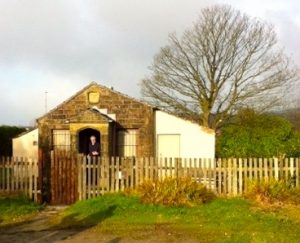
Situated at the northern end of Rooley Moor Road and built in 1897 as an after hours drinking den for local quarry workers, the club is not open to the public but by invitation only. If you are following Rooley Moor Road the club is approached down a hill, then a dirt track, through a gate from which a path leads to the tiny wooden club building in the middle of a field.
There are two small rooms, the front room is where most members congregate and is furnished with a delightfully eclectic mix of old seats and tables, signs and photos. There is no mains electricity, light is provided by gas lights and warmth by an ancient single-flame gas heater.
The Club is open only for limited hours on four nights a week. Members go into the tiny cellar to serve themselves drinks, but have to continually whistle so that the other members can tell that they aren’t taking a sly tipple. No food is served, except for nuts and they can’t sell crisps because they get damp.
The whereabouts of the club cannot be revealed on pain of death. However, you may enquire from CAMRA.
White Lion – 240 Rooley Moor Road
In 1885 Elizabeth Brierley is recorded in the Rochdale Trade Directory as the landlady.

